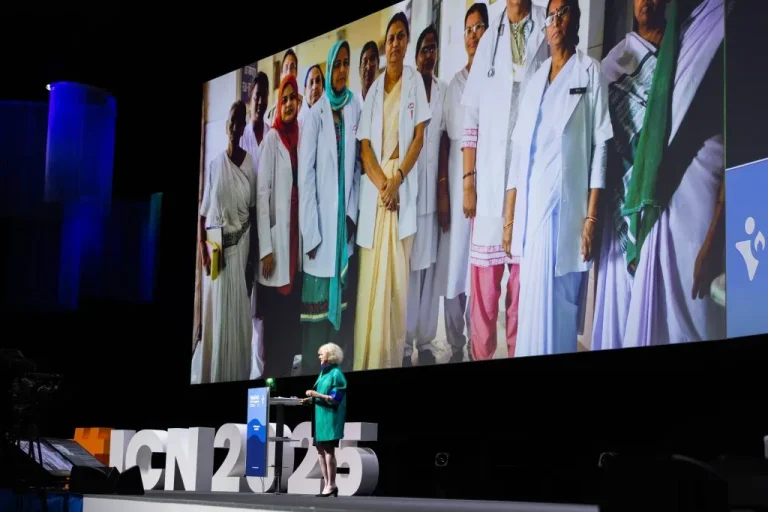Global nursing and health leaders have called on governments across the world to invest in nursing on an international scale, for the sake of achieving universal health coverage.
At the 2025 International Council of Nurses (ICN) Congress, held in Helsinki last week, the topic of the United Nations sustainable development goals (SDGs) for 2030 was repeatedly brought up.
“We cannot protect the dignity of people nor create the sustainability of systems, without nurses”
Pamela Cipriano
These goals are a 17-point call to action for world leaders to achieve a fair, equitable and just society for all.
Among the goals are aims to eradicate inequality and hunger, curb the impact of climate change and increase access to education.
The third SDG is for ‘good health and wellbeing’, which includes a target of universal health coverage, meaning all citizens can access the healthcare they need without facing financial barriers.
Speakers and attendees at ICN Congress 2025 discussed what needed to be done to meet the goal by 2030.
ICN president Dr Pamela Cipriano, in a speech to the event, said it was “clear” that a pathway to stronger health systems and the SDGs did not exist without nurses.
“ICN has been very consistent in addressing the need for a healthy workforce, an adequate workforce, a well prepared and supported workforce,” she said.
“We cannot get to universal health coverage without health workers, and we cannot protect the dignity of people nor create the sustainability of systems, without nurses.”
ICN Congress also hosted discussions on the impact of international development cuts from wealthy countries, such as the UK and, most prominently, the US, on progress towards the SDGs.
Since his re-election, US president Donald Trump has announced plans to pull the country’s funding to the World Health Organization and axe the United States Agency for International Development (USAID), which funds humanitarian projects.

From left, Leslie Mancuso, Masami Sakoi, Pamela Cipriano
Dr Leslie Mancuso, nurse and chief executive of international nonprofit Jhpiego, told congress that organisations like hers, which support the bolstering of health systems in developing countries, had found they were hitting “headwinds” in the quest for universal health coverage.
“This isn’t an easy time to be working in global health or for an international non-governmental organisation around the world,” Dr Mancuso said.
“Financial strain and shifting geopolitical priorities are already undermining the very programmes that have expanded access to care.
“Recent funding cuts are hindering nurse-led programmes in some of the most critical areas.”
These areas, Dr Mancuso said, included maternal, newborn, child, women’s and sexual health, as well as the prevention of infectious diseases.
She said that she had seen the impact of international development cuts “firsthand”, and that some programmes it was involved in “stopped within a day”, with the losses of nurses, midwives, doctors and other healthcare experts due to a lack of funding.
“If you want that photo opportunity [in] 2030 to say, ‘we did it’, you’re going to have to invest in nursing”
Howard Catton
Projects impacted, according to Dr Mancuso, included a nurse-led cervical screening programme in Cameroon and a maternity care improvement drive in Afghanistan.
Dr Mancuso added, however: “Yet, in this moment of strain, there is resilience and evidence [that] when we invest wisely, we ignite lasting change.
“The nursing profession, despite the challenges, continues to stand firm, inspiring hope for the future.”
She said global health was in “crisis”, but that the “path forward” was clear, drawing on evidence from the ICN that money invested in nursing brought about economic returns for countries.
Dr Mancuso joined calls to invest in nursing, but also called on nurses at the event in Helsinki to “reclaim the SDG promise” with nurses “at the helm”.
WHO technical officer for nursing and midwifery, Dr Carey McCarthy, speaking with Nursing Times, said that the impact of the budget cuts was “concerning”.
She added: “We know, in terms of US federal funding [cuts], how that has impacted [some countries’] ability to support health workers.”
She said she expected new data to soon show how international development cuts had led to a reduction in nurse availability in some areas and, in turn, the impact on achieving universal health coverage.
ICN chief executive Howard Catton said the world was off-track to meet the SDGs, but that investing in nursing was crucial to reversing this.
“If you want that photo opportunity [in] 2030 to say, ‘we did it’, you’re going to have to invest in nursing,” he said.

